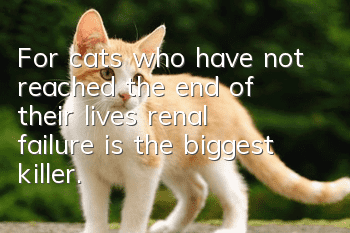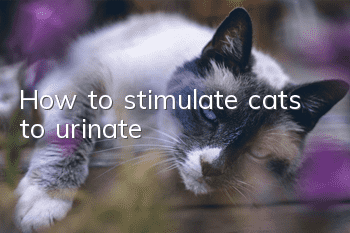For cats who have not reached the end of their lives, renal failure is the biggest killer.

Death is what all living beings long for, but in the process of life, we will always encounter various "Cheng Yaojin" that hinder life and health, and a large part of cats' health problems come from kidney failure. Kidney failure is divided into chronic and acute. Let’s take a look at how cats can prevent these problems.
Feline chronic renal failure:
Chronic renal failure is a severe syndrome in the late stages of various chronic kidney diseases. Due to renal excretion and regulatory dysfunction, many clinical manifestations of severe metabolic disorders and imbalances of water, electrolytes and acid-base balance occur. In most cases, the disease develops and worsens gradually over time, with the rate of disease progression varying greatly between individuals and often occurring in middle-aged and older cats.
Note: It usually occurs in cats over 7 years old, and becomes more common with age. It can also occur in dogs, but the incidence in cats is 3 times higher.
Five main functions of the kidney
· Filter waste products from the body (mainly urea and creatinine)
· Regulate electrolytes (potassium, calcium, phosphorus, sodium)
· Promote the production of erythropoietin and help stimulate the bone marrow to produce red blood cells
· Production of renin, an enzyme that controls blood pressure
· Produce urine
Whether animals or humans, the reason why they have two kidneys is because the body will gradually lose kidney function over time, so the other kidney is used as a reserve. In fact, only 30% of kidney function is needed to maintain normal body needs. Therefore, until about 70% of kidney function is lost, no symptoms will appear and the body can still function normally. However, if symptoms of kidney disease appear, it can already affect life. Parents, please do not hesitate to send the cat to the hospital for treatment immediately.
Symptoms and Diagnosis:
· Excessive urination, constipation/diarrhea
· Drink more water
· Vomiting (clear/foamy liquid/food)
· Decreased appetite/refuse to eat,
· Drooling
· Muscle atrophy, weight loss, dehydration (the fur on the neck cannot be retracted/it takes a long time to retract)
· Lethargy and high sensitivity to sounds
· Oral ulcers/bad breath
· Retinal detachment
· Convulsions, low-grade fever, and coma (already very serious symptoms)
Note: Increased urine output can cause or worsen urinary incontinence, especially at night.
In addition to the above symptoms, symptoms such as fractures (weakened bones), blindness (blood pressure is too high), and itchy skin (calcium and phosphorus are deposited on the skin) may also occur. Although they are less common, parents still need to pay attention.
Stages and symptoms of chronic renal failure
Since most of the symptoms of chronic kidney disease are similar to other diseases, it is often difficult to judge. In short, once the symptoms mentioned above appear, please send the cat to the hospital immediately for further confirmation by a doctor through clinical testing. After all, early Some treatments can also relieve your cat's pain earlier.
· Blood test
The blood levels of urea and creatinine (indicators of kidney function), red and white blood cells, potassium, phosphorus and other electrolytes are assessed.
· Urine sample
Based on the concentration assessment, the degree to which the kidneys concentrate/dilute urine can also be assessed for protein, red and white blood cells and other bacteria in the urine. In addition, the urine protein to creatinine ratio can be measured to help improve the cat's kidney function.
· B-ultrasound/X-ray film
In cats with chronic renal failure, the kidneys are usually small, reflecting the death of a large number of nephrons. If your kidneys are large, you should consider certain causes of CKD, such as lymphoma (cancer) of the kidneys, or a rare disease called amyloidosis.
· Bacteria detection
Bacterial infections are not a common cause of chronic kidney failure, but cats with the disease may develop bacterial infections because their immune systems decline when their kidneys fail.
Chronic kidney failure is primarily tested through blood and urine, but other tests can find underlying causes or "grade" its severity.
Incentives:
There are many causes of chronic renal failure. If the underlying factors can be identified early, in some cases, prevention and quality can be achieved to help extend life. Then in most cases, no specific cause can be found.
· Degenerative kidney disease, often associated with elderly cats
· Polycystic kidney and other congenital renal anomalies (especially Persian cats and related breeds)
· Bacterial infection (can rise from the bladder or spread through the bloodstream)
· Kidney tumors (lymphosarcoma is the most common, leukocyte-infiltrating tumor)
· Viral infection (feline immunodeficiency virus or feline infectious peritonitis)
· Amyloid deposits in the kidneys
· Drugs or toxins can damage the kidneys
· Hypertension, hypokalemia
Note: Cats with high blood pressure will usually be agitated, pacing back and forth, bleeding from the eyes/nose, sudden heat (redness) in the ears, epilepsy, trembling, and howling at night; cats with hypokalemia will be weak and weak when standing. Lifting of forelimbs, hoarseness of voice, and stiff neck (difficulty raising head).
In addition, kidney development defects and persistent inflammation (such as glomerulonephritis) in kittens at birth can also lead to chronic renal failure.
Treatment:
1. Diet management
· Moisture
Cats with chronic neurological failure are very susceptible to dehydration due to a reduced kidney's ability to conserve urine by concentrating urine. In order to maintain a good fluid intake, in addition to sufficient clean water sources, you can eat more foods with high water content (such as canned food).
· High protein
Many causes of kidney failure are due to the buildup of large amounts of toxins in the blood (the result of protein breakdown), so feeding a low-protein diet will help reduce the production of toxins. However, too little protein intake can also lead to underweight, which is extremely detrimental to health. Protein intake must be carefully controlled.
Note: Because low protein intake is difficult to control, it is recommended to eat branded commercial grains specifically related to this.
· Low phosphate
Restricting the phosphate content in the diet can effectively protect the kidneys from further damage in chronic renal failure; or taking phosphorus binders, such as lanthanum carbonate (Forsilinol/Letrox Phosphate/Lanthanum Carbonate Powder), citric acid Iron (living kidney), etc.
Note: Regarding the analysis of phosphorus binders, it is not recommended that you buy the calcium-containing phosphorus binders on the market, which are the worst and can cause an increase in blood calcium (although it is very easy to buy).
Lanthanum carbonate. It has strong effects but serious side effects (especially cats with digestive system problems, chronic constipation, diabetes and cats using amlodipine). It can cause constipation and vomiting. Long-term consumption can cause calcium accumulation in blood vessels (cats with heart disease are not suitable for this).Recommended use); ferric citrate. Due to the lack of experimental data, the iron content in the blood needs to be tested after taking the medicine.
2. Prescribe the right medicine
· Hypokalemia supplementation
Oral potassium gluconate tablets, 2/day at the beginning, 1.5/day after stabilization, taken in 2 divided doses; potassium citrate tablets, 1/day for a 3kg cat, 1.5/tablet for a 4kg cat, divided into 2 doses .
· Vitamin B
As urine output increases, water-soluble vitamins (such as vitamin B) are lost in large quantities, so cats suffering from chronic kidney disease need vitamins 2-4 times higher. You can take medicines, such as vitamin B complex tablets, mix 1/2 or 1/3 of the medicine into food every day; vitamin B12 tablets, mix 1/4 or 1/8 tablets into food every day. Or infusion, such as lactated Ringer's solution.
· ACE inhibitors
Benazepril, for example, is a vasodilator. It can effectively help reduce protein loss, especially suitable for cats with severe protein loss in urine.
· High blood pressure
Cats with chronic renal failure who have hypertension are at risk for further development. Therefore, timely treatment is possible at the time of diagnosis. Using saline to rehydrate, reducing vitamin D intake, and providing a high-fiber diet are all good treatments.
· Anemia
Anemia is common in end-stage renal failure. There are a variety of treatments, such as anabolic steroids, iron supplements, supplements with erythropoietin (a hormone that stimulates red blood cell production), or blood transfusions, depending on the cause and severity of the anemia.
· Vomiting/dehydration
For cats with severe vomiting, feed antiemetics or vitamin injections; for dehydrated cats, give intravenous/subcutaneous injections of nutrient solutions, etc.
Note: The above is for reference only. The specific plan needs to be comprehensively judged by the doctor based on the cat’s potential cause, age and severity of illness.
Prevention:
Because kidney disease requires accumulation and changes over a long period of time (or even years), there is no way to prevent such diseases with current medical methods. It is recommended that parents take their cats for regular physical examinations to achieve the purpose of early detection of kidney disease. Especially for middle-aged and elderly cats (about 7 years old) and cats with congenital kidney diseases such as polycystic kidney disease (such as Persian cats), the earlier they are examined and treated, the better the effect. Cats are relatively fragile, so they should pay more attention to their diet and lifestyle, so that when the disease occurs, it will not be easy to cure.
Recommended Good Things
Aineng Pet Odor Eliminating Disinfectant can effectively remove body odor/feces odor and other odor molecules! Effective in treating skin diseases caused by fungi/bacteria! Can kill parvovirus/canine distemper virus/coronavirusetc!
It is edible grade for pets, does not contain fragrances, does not contain chemicals, can be sprayed directly, and is harmless to human pets!
Consultation: 13028809308 (WeChat synchronization)
Scan the QR code on WeChat to enter the purchase
- How to correct a kitten that only eats meat but not cat food
- The cat keeps vomiting and can't come out
- Why is it said that raising cats will last three generations?
- Take your cat for vaccination promptly
- What should office workers do if they keep a cat during the day?
- Is it harmful for adult cats to eat kitten food?
- Characteristics of Maine Coon cats
- Can cats eat radishes?
- What are the main functions of a cat’s nose?
- Do you know the misunderstandings about bathing cats?



